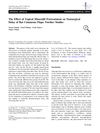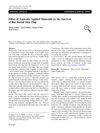Ischemic Skin Flaps: What to Use to Save Them? A Narrative Review
January 2023
in “
Foco
”
Hirudoid dimethyl sulphoxide troxerutin heparinoid Epigallocatechin Gallate octreotide Xuebijing injection Na+ – H+ exchange inhibition smoking cessation nitroglycerin minoxidil heparin aspirin oxygen-free radicals allopurinol superoxide-dismutase hyperbaric oxygen erythropoietin vascular endothelial growth factor EGCG Rogaine VEGF

TLDR Various substances, quitting smoking, and certain topical applications can enhance the survival of skin flaps used in surgery. Oxygen-free radicals play a role in tissue injury, but certain treatments can have beneficial effects.
This narrative review explores various methods to enhance the survival of ischemic skin flaps, often used in reconstructive surgery. Several substances, including Hirudoid, dimethyl sulphoxide, troxerutin, heparinoid, Epigallocatechin Gallate, octreotide, and Xuebijing injection, have shown positive effects on skin-flap survival in rat studies. Inhibiting Na+ – H+ exchange can also reduce ischemic injury in rat skin flaps. Smoking cessation, topical applications of nitroglycerin and minoxidil, and the use of heparin and aspirin have been found to improve flap survival. The review also highlights the role of oxygen-free radicals in ischemic tissue injury and the beneficial effects of allopurinol, superoxide-dismutase, and hyperbaric oxygen. Erythropoietin and vascular endothelial growth factor also positively affect the survival of critically perfused flap tissue.


